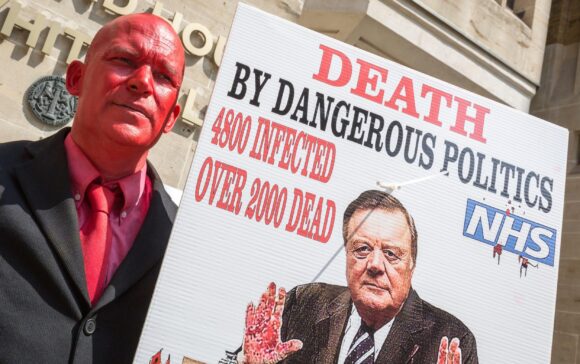Reading The Poison Line by Cara McGoogan for the Telegraph, 17 September 2023
Mayor Treloar College, founded in 1907 for the education and care of physically disabled children, was more than just a school for Ade Goodyear. The teaching and medical staff were more like an extended family. Dr Anthony Aronstam, director of the Treloar’s haemophilia centre, used to invite Ade and his schoolfriends over to his house where they drank lemonade and swam in the pool.
One afternoon in the summer of 1984 Ade found Aronstam bent over his desk, trembling. “‘We’ve fucked up,’ Aronstam said. ‘We’ve messed up, boys. I’ve messed up. It’s all gone wrong.’”
In the face of a gathering global calamity, Aronstam had been assessing Ade, without his knowledge, for signs of AIDS. Two of Ade’s schoolfriends were already diagnosed. One, Richard Campbell, had already died. By 1986 Aronstam had forty-three patients who were HIV positive. He wrote in a report, “”There are gloomier predictions about, which suggest that up to 100 per cent of the infected haemophiliac population will eventually succumb to the virus.”
The Poison Line is the first book by journalist Cara McGoogan. It began life as a couple of features written for this paper in the opening week of the Infected Blood Inquiry in 2019.
It may seem thin praise to single out the way McGoogan has arranged her material here, but truly the effort has been superhuman. This is the story of a global medical scandal, implicating health services, pharmaceutical companies and whole governments, and unfolding slowly enough, and meeting obstacles enough, that many of its victims died before they ever saw justice, never mind compensation. It is told, for the most part, through the recollections of the victims, their families, their doctors, their legal and political representatives. That so many individual stories here burn their way into the reader’s skull is testament to the strength of the source material, of course, but there were so many plates McGoogan could have dropped here and didn’t, so many stories to leave hanging and implications to leave unexplored, that there ought to be some sort of award for literary juggling established in her name.
Treloar College is just the most familiar domestic emblem of a crisis that played out across the US, UK, mainland Europe, and south-east Asia. It began when a new, much quicker, more convenient and more comfortable way was found of administering blood clotting factors to haemophiliacs. Factor VIII, a freeze-dried powder derived from blood, was infected with hepatitis B, but since this infection was common among haemophiliacs anyway, and went away in time, the issue was ignored. Consequently, other agents infecting Factor VIII went undetected, including HIV and hepatitis C.
Institution after institution doubled down on their original error in allowing and promoting a tainted product. In the UK, ministers themselves come out of this account surprisingly well, as McGoogan traces their appalled investigations into decades of deliberate cover-up. It was left to Jeremy Hunt, “the epitome of the establishment politician”, to sum up the disaster as “a failure by the British state. I don’t think there’s any other way to describe it.
The second half of Poison Line, about the victims’ courtroom battles, reveals the economic drivers of the scandal. By the 1990s plasma was more valuable than gold and oil. Most Factor VIII was produced in the US, and American blood bankers, who are allowed to pay donors for plasma, were gathering blood from wherever they could: outside nightclubs, from inside prisons, and from a centre in Nicaragua nicknamed the ‘House of Vampires’, which collected plasma from up to a thousand people a day. The there was the way Factor VIII was made: any one injection could contain the blood of twenty-five thousand people.
As McGoogan’s account gathers pace and scale, the more existential the issues become. At what point does a corporation countenance the death of its customers? In what institutional setting will a doctor think it reasonable to tell an AIDS-infected mother that “Women like you should be sterilized”? What level of conformism does it take for the mother of a seventeen year old, infected with HIV from a haemophilia treatment, to tell him that he’s brought shame on her, and throw him out the house?
By the closing pages, we seem to have left the news pages behind entirely, and be wrestling with something that looks very like the tragedy of the human condition.

